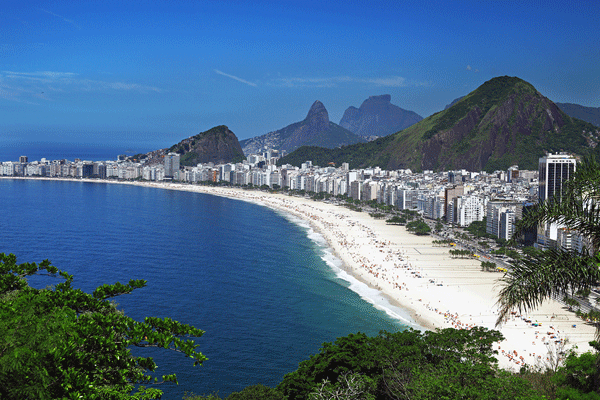Understanding the Health System in Brazil
Summary: Learn about the health system in Brazil: how it can and cannot be used by expats, nomads, retirees and others moving to and living in Brazil.

Brazil has a public and private healthcare system, both of which are available to foreigners. The public healthcare system is called Sistema Único de Saúde (SUS) and is free for all citizens and legal residents. Expats and digital nomads are allowed to use the public healthcare system, however, it is not recommended for serious medical emergencies or major surgery. Public hospitals in Brazil are often overcrowded and underfunded, and the quality of care can be inconsistent.
Brazil's Private Healthcare System
Private healthcare in Brazil is more expensive than public healthcare, but it is often of higher quality. Private hospitals are well-equipped and staffed with experienced medical professionals. Expats and digital nomads typically use private hospitals for serious medical emergencies and major surgery. Private health insurance is available in Brazil, and many expats and digital nomads opt for specialized expat health insurance providers.
Brazil's Top Hospitals
Some of the most well-known hospitals in Brazil include:
- Hospital Sírio-Libanês (private) in São Paulo
- Hospital Albert Einstein (private) in São Paulo
- Hospital das Clínicas da Faculdade de Medicina da Universidade de São Paulo (public) in São Paulo
- Hospital Moinhos de Vento (private) in Porto Alegre
- Hospital Santa Catarina (private) in Florianópolis
- Hospital do Coração (private) in São Paulo, specializing in cardiology
Health Insurance Companies in Brazil
The most popular private health insurers in Brazil are Amil, Bradesco Saúde, SulAmérica Saúde, and Unimed. These companies offer a range of health insurance plans, including plans for expats and digital nomads. Expats and digital nomads typically use these companies or specialized expat health insurance providers.
Insider Tips from Expats in Brazil: How to Navigate the Health System
"Compared to the US, is cheap and for "normal" health problems as good as if not better than the US, however, I have been away from the US for such a long time, my opinion may be very relevant," commented one expat living in Goiania, Brazil.
"Brazil has a public health care policy and as a permanent resident I have access to and use their public health care clinics for relatively minor issues. For all other I have a Private health care plan and excellent private doctors in Natal, Brazil just 1 hour away," mentioned one expat living in Brazil.
"public health care is used by us for minor issues. Major medical we travel 1 hr north to Natal for private doctors and health care," said an expat in Brazil.
"I don't know how to characterize my health insurance plan. It is from Brazil but it is not a public plan. It is a private, Brazilian plan (Unimed Rio). And it is good. The medical care is excellent and although the plan is about what I'd pay in the States, I can get more for the money," remarked one expat in Brazil.
"Brazil has a comprehensive public health system, providing free medical care to all citizens. Private health care is also available, and is often of a higher quality than public health care. Brazil has a large number of hospitals, clinics, and medical centers, and many of them are well-equipped and staffed with experienced professionals. Brazil also has a number of specialized medical centers, such as cancer treatment centers, and centers for the treatment of infectious diseases. In addition, Brazil has a number of medical research centers, which are dedicated to researching and developing new treatments and technologies," said one expat living in Brazil.
"Brazil does have a National Health Care program and my wife and I have taken advantage of this service for relatively minor health issues. But it is a national health care program that must be funded by the government with many cities such as Rio de Janerio unable to fund many of these clinics and public hospitals to the degree that they should be. We are retired and our health issues are relatively minor but we feel strongly about having a paid for medical insurance plan. This plan pays for annual physicals that include treadmill stress test, visit with cardiologist, Urologist, blood tests and a personal consultation with your doctor about the results. Mine lasted nearly a full hour. We looked for a doctor who spoke English and was very good in his/her field. We chose a private practice doctor in Natal, Brazil who performed his studies under the direction of Dr. Christian Bernard in South Africa. So my advice.......live in or near a big city such as Natal, Brazil, spend some time talking with insurance agents about doctors and qualifications in your area and do not depend only on the national social medicine programs. Purchase private medical insurance. Mine is from AMIL who's parent company is United Health Care," commented one expat living in Natal, Brazil.
"Healthcare services in Brazil are provided by both public and private institutions. The public healthcare system is known as the Unified Health System (SUS) and is funded by the government. It provides free healthcare to all citizens and permanent residents, including foreign residents. The quality of public healthcare varies from region to region, with some areas having better access to resources and better quality care than others. Expats in Brazil can use the public healthcare system, but they may need to pay for some services. Private healthcare is also available and is often preferred by expats due to its higher quality of care. Private healthcare is usually more expensive than public healthcare, but it can provide more comprehensive coverage and access to better facilities," mentioned one expat living in Brazil.
About the Author
 Joshua Wood, LPC joined Expat Exchange in 2000 and serves as one of its Co-Presidents. He is also one of the Founders of Digital Nomad Exchange. Prior to Expat Exchange, Joshua worked for NBC Cable (MSNBC and CNBC
Primetime). Joshua has a BA from Syracuse and a Master's in Clinical and Counseling Psychology from Fairleigh Dickinson University. Mr. Wood is also a licensed counselor and psychotherapist.
Joshua Wood, LPC joined Expat Exchange in 2000 and serves as one of its Co-Presidents. He is also one of the Founders of Digital Nomad Exchange. Prior to Expat Exchange, Joshua worked for NBC Cable (MSNBC and CNBC
Primetime). Joshua has a BA from Syracuse and a Master's in Clinical and Counseling Psychology from Fairleigh Dickinson University. Mr. Wood is also a licensed counselor and psychotherapist.
Some of Joshua's articles include Pros and Cons of Living in Portugal, 10 Best Places to Live in Ireland and Pros and Cons of Living in Uruguay. Connect with Joshua on LinkedIn.
Additional Information:
- Brazil Guide
- Healthcare & Health Insurance in Brazil
- Members Talk about Healthcare & Health Insurance in Brazil
- Best Places to Live in Brazil
- Real Estate in Brazil
- Guide to Real Estate in Brazil
- Pros & Cons of Living in Brazil
- Cost of Living in Brazil
- Understanding Mental Health in Brazil
- Is Health Insurance Required When Moving to Brazil?
- Having a Baby in Brazil
- Health Insurance in Brazil
- 2025 Guide to Living in Brazil
- Pros and Cons of Living in Brazil 2025




